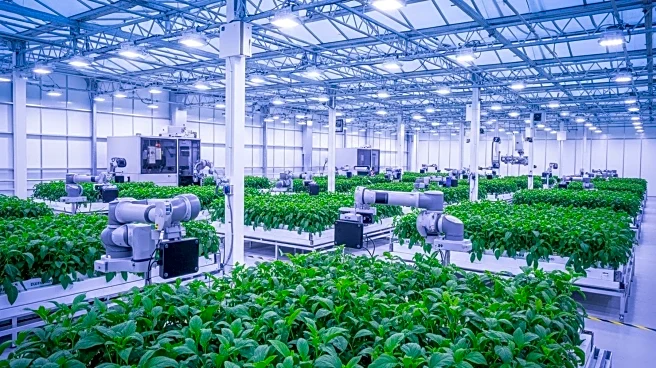What's Happening?
Yuma, Arizona, known as the 'Winter Lettuce Capital of the World,' is a key agricultural hub in the United States. The region's favorable climate allows for year-round farming, particularly during the winter months when other parts of the country face colder weather. This unique geographic advantage supports the production of a wide variety of crops, including lettuce, broccoli, cauliflower, spinach, and melons. Agriculture is the backbone of Yuma's economy, generating billions in revenue annually and supporting thousands of jobs. The sector offers diverse employment opportunities, ranging from field labor to advanced management and technology-based positions. As the industry adapts to new technology and changing workforce demands, roles such as agricultural technicians, farm equipment operators, and management positions are becoming increasingly important.
Why It's Important?
The expansion of agriculture jobs in Yuma is significant for several reasons. Firstly, it supports the local economy by providing stable employment opportunities and career growth for residents. The sector's reliance on technology is driving demand for skilled workers, which could lead to higher wages and improved job quality. Additionally, Yuma's agricultural output is crucial for the U.S. food system, particularly during the winter months when it supplies over 90% of the country's leafy vegetables. The integration of technology in agriculture, such as satellite monitoring and precision farming tools, is enhancing productivity and sustainability, ensuring Yuma remains a leader in American food production.
What's Next?
As Yuma's agriculture sector continues to evolve, the demand for technology-driven roles is expected to grow. By 2025, positions such as AgriTech technicians and irrigation specialists are projected to increase by 15%, reflecting the industry's shift towards digitalization. Local employers and government agencies are focusing on improving job quality, training opportunities, and living conditions for agricultural workers. This includes addressing challenges such as seasonal unpredictability, healthcare access, and language barriers. The ongoing reforms aim to create a more stable and equitable workforce, ensuring Yuma's agriculture sector remains competitive and sustainable.
Beyond the Headlines
The technological advancements in Yuma's agriculture sector are not only transforming job roles but also reshaping the industry's approach to sustainability and resource management. The use of satellite data, blockchain traceability, and smart irrigation systems is promoting transparency and efficiency, reducing waste, and enhancing crop yields. These innovations are crucial for meeting the growing demand for food while minimizing environmental impact. As Yuma embraces these changes, it sets a precedent for other agricultural regions in the U.S., highlighting the importance of integrating technology into traditional farming practices.









